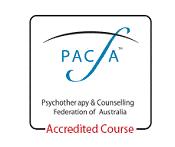Learn to help people improve their mental health and emotional wellbeing
Our program is taught by registered counsellors and psychologists, and qualified clinical supervisors. It is designed to give you the skills to become a professionally accredited counsellor in human services.
- Only a full-time option is available to international students on a Student visa. Online programs are not available to Student visa holders.
- * Estimated tuition fees are based on 2025 rates. Refer to international fees for more information.
- Not all majors/minors and elective options are available at every campus. You should refer to the What Can I Study tab, and the proposed study sequence for your chosen campus and intake for further information.
- * In addition to being able to study all courses at Sippy Downs, students may choose to complete some first-year courses at Gympie. Only first-year courses are offered at Gympie. The remainder of the degree is completed at Sippy Downs.
- * In addition to being able to study all courses at Sippy Downs, students may choose to complete some first-year courses at Gympie. Only first-year courses are offered at Gympie. The remainder of the degree is completed at Sippy Downs.
Our program is taught by registered counsellors and psychologists, and qualified clinical supervisors. It is designed to give you the skills to become a professionally accredited counsellor in human services.
This program equips you with a range of counselling knowledge and skills to work ethically and professionally with clients who seek help. You’ll also develop knowledge in psychology, counselling theories and skills, cultural diversity and specialist areas such as family therapy, and trauma and crisis counselling.
The program is accredited with the Australian Counselling Association, Psychotherapy and Counselling Federation of Australia, and Australian Community Workers Association. In your final year of study you’ll undertake two placements in a human services agency. Your placements total 500 hours (combined) and are organised by our staff.
Our students have completed placements in agencies such as the Department of Communities, Relationships Australia, Child Safety and Autism QLD and many have also lead to graduate employment. As well as being employed as counsellors, our recent graduates are now working as case managers, child safety officers, court support workers and probation and parole officers.
Post-admission requirements
Students must complete two internship placements at approved agencies. A Blue Card (CCYPCG) is required — refer to Program requirements.
Career opportunities
Mental health, welfare work, aged services, child protection, disability services, counselling individuals, families and groups, youth.
Membership
 Australian Counselling Association; Australian Community Workers Association; any counselling membership association approved by the Psychotherapy and Counselling Federation of Australia.
Australian Counselling Association; Australian Community Workers Association; any counselling membership association approved by the Psychotherapy and Counselling Federation of Australia.
Accreditation
Psychotherapy and Counselling Federation of Australia; Australian Community Workers Association; Australian Counselling Association
Program structure
Introductory courses (6)
COR109 Communication and Thought
COU101 Theories and Systems of Counselling and Psychotherapy
COU180 Introductory Counselling Skills and Theory
PSY100 Introduction to Psychology A
PSY101 Introduction to Psychology B
SCS130 Introduction to Indigenous Australia
Advanced courses (14)
COU200 Communication and Relationships
COU261 Counselling Development and Supervision 1
COU262 Counselling Development and Supervision 2
COU263 Counselling Placement 1
COU264 Counselling Placement 2
COU265 Strengths Based Counselling: Collaborative Approaches
COU276 Group Processes and Practice
COU281 Developmental and Family Counselling
COU300 Counselling Skills for Crisis, Disaster, Grief and Loss
COU301 Positive Psychology for Counselling
PSY203 Introduction to Human Development
SCS225 Social Research
SCS278 Ethics and Professional Practice
SCS290 Understanding Cultural Diversity
Elective courses (4)
Select 4 elective courses from either faculty (Arts and Business or Science, Health, Education and Engineering).
Note: Not all USC courses are available on every USC campus.
Total units: 288
Program requirements and notes
Program requirements
In order to graduate you must:
- Complete 6 required introductory level (100 coded) courses.
- Complete 14 required advanced level (200/300 coded) courses.
- Complete 4 elective courses.
- Successfully complete 2 field education placements (COU263 and COU264 ).
- Complete no more than 10 introductory level (100 coded) courses, including the core course.
- Complete no more than 6 courses from the School of Business or Faculty of Science, Health, Education and Engineering.
- Register any selected Majors or Minors with your Faculty.
In order to commence field education placement you must:
- Hold a valid Blue Card, throughout the duration of your program, which is issued by the Commission for Children and Young People and Child Guardian (CCYPCG). You should allow 12 weeks for CCYPCG to issue the card. Note: students who do not possess a valid Blue Card will be unable to complete the field education component of their program and will be unable to meet graduation requirements.
- Have a National Criminal History check (by Queensland Police Service or other state/territory authority).
- Travel to attend field education placements.
- Please note, while all endeavours will be made to place students in a given semester, this is not guaranteed and students may need to enrol at a later time should a position in an agency be unavailable in the preferred semester.
Program notes
- Completing this program within the specified (full-time) duration is based on studying 48 unit points per semester (normally 4 courses).
- Electives may be used to complete and additional major or minor to supplement the required major.
- Courses within this program are assessed using a variety of assessment methods including essays, seminar presentations, reports, in-class tests and examinations. Not all courses will necessarily include all methods.
- As part of your USC program, you may apply to Study Overseas to undertake courses with an overseas higher education provider. It is advisable to contact your Faculty Program Advisor to discuss timing and course issues.
- Only a full-time study option is available to international students on a Student Visa.
- Refer to the English language requirements.
- When enrolling, refer to the Study Plan.
